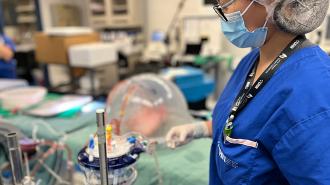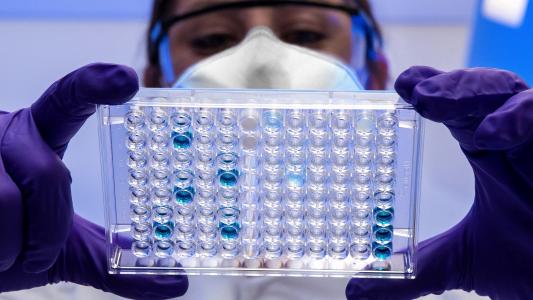Matching blood types between organ donors and recipients is a prerequisite for a transplant. If they don’t match, the recipient’s immune system will reject the new organ.
As a result, people wait a long time to be matched with a new heart or lung — if they get one at all. Every day, 17 people die in the U.S. because of the shortage of compatible donations.
However, these barriers may be coming down. A new study reveals that if donor organs were treated with specific enzymes, any organ could become “universal” and be more compatible with recipients of any blood type.
“If you convert all organs to universal type O, you can eliminate that barrier completely.”
Marcelo Cypel
The study offers new hope for cutting down on wait times for patients in need, saving more lives.
“This research is really a game-changer in organ transplantation,” Aizhou Wang, the lead author of the paper, told STAT News. “For modern transplant medicine, matching is always part of the criteria when you are trying to find the suitable organ for a recipient.”
Why universal blood type matters: A, B, O, and AB are the four primary blood types. Antigens on the surface of blood cells and in blood vessels define the blood type — A and B antigens define their types, and AB blood has both types of antigens.
If we get a blood transfusion or an organ transplant with antigens that are foreign to our bodies, our immune system will react and attack the foreign organ or blood. That’s why patients’ blood types need to be matched with donor organs.
Blood type O is considered the “universal donor” because it doesn’t have any of these antigens attached to it, so everyone’s immune system can accept it. Unfortunately, the supply of type O donations is limited.
“With the current matching system, wait times can be considerably longer for patients who need a transplant depending on their blood type,” Marcelo Cypel, the senior author of the study published in Science Translational Medicine, said in a statement.
People with blood type O who need a transplant can wait the longest because they can only receive an organ from a type O donor. In contrast, blood types A, B, or AB have more options. For example, a person with type A could receive a transplant from a blood type A or the universal type O donor. Type AB can receive a donation from any other type.
“Having universal organs means we could eliminate the blood-matching barrier and prioritize patients by medical urgency, saving more lives and wasting less organs,” Cypel said. “If you convert all organs to universal type O, you can eliminate that barrier completely.”
The study: Cypel’s research lab at the Latner Thoracic Surgery Research Laboratories conducted the proof-of-concept study.
The team used an Ex Vivo Lung Perfusion (EVLP) System, which circulates nourishing fluids into organs. This warms the organs to body temperature and allows them to heal before transplanting.
To conduct their experiment, they selected type A donor organs that were unsuitable for transplants, so it wouldn’t waste a good organ if the experiment didn’t work.
They put two pairs of lungs in the EVLP, where one was treated with enzymes that strip the organ of type A antigens. The scientists next put the lungs through a series of tests, including introducing type O blood to the lungs to simulate a transplant from a type A donor to a type O recipient — which, under normal circumstances, is incompatible.
They found that the lungs treated with the enzyme were well tolerated, whereas the untreated lungs were rejected in the simulated A to O transplant.
Next, the team is proposing a clinical trial, which they hope to launch in about a year.
We’d love to hear from you! If you have a comment about this article or if you have a tip for a future Freethink story, please email us at [email protected].






